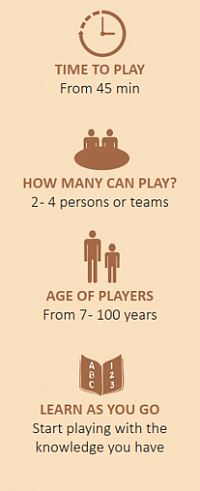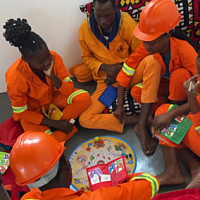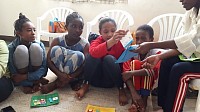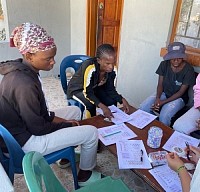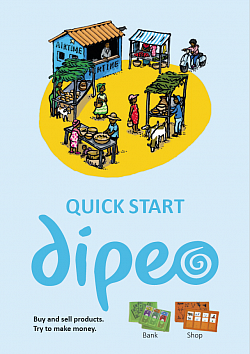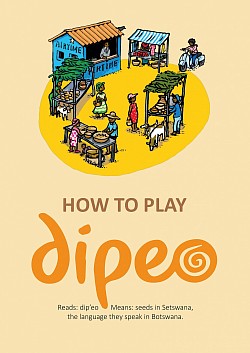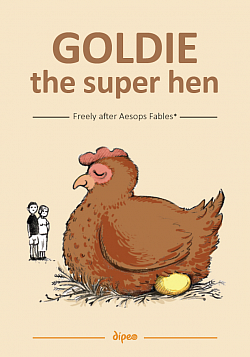What we do
A down-to-earth and playful way of learning.
Dipeo is a board game designed to create learning opportunities through play. You buy and sell farm products such as seeds, chickens, goats and cows. You can start with a bag of seeds and end up with a vegtables and livestock –and a sustainable livelihood. Small becomes big.
The player who has made the most values – both in cash and products – will be the winner. You don’t need to make it difficult for others to win because the important thing is to make your own money grow.
Use your head and have a bit of luck.
Learn by playing
The Dipeo game is suitable from the age of 7 and up and is played with 2-4 players or teams. One game lasts from 45 minutes.
Dipeo can be played both outdoors and indoors — on the ground or on a table.
Learn by doing. The players learn by trying out different strategies, and in a tangible way they find out what is smart to do — or not.
The challenges are basic and easy to recognise. Rich illustrations bring the board game to life – and makes it easy to understand.
When the players move from space to space on the game mat, different things will happen along the way. They will have to look for opportunities, think ahead, be faced with choices, and act on them. They engage in trade activities, budget their money — and can choose to take a risk to make their money grow.
Step by step. The game contains 4 steps with different learning opportunities, from the basic game to more advanced options.
Step 1: Play the basic game. Practice calculations and decision-making.
Step 2: Get customers. Without customers the business will not grow.
Step 3: You can both save and borrow money to reach your goals.
Step 4: Make your own rules. Use your creativity.
Click here to see the game rules in short scenes on video.
How to organise Dipeo play
There are many ways to organise the use of Dipeo. Find a way that suits you and your group.
To get to know the full potential of the game it is useful that a coordinator takes responsibility to become extra familiar with the game. The responsible person will be a facilitator.
How to become a facilitator
The facilitator assists the group and help them to learn, without telling them exactly what to do. For example, a facilitator will encourage the players to make their own decisions, and discuss the outcome afterwards.
In the Facilitator Guide there are detailed suggestions for how a facilitator can help make it fun to learn and enhance the many learning opportunities embedded in the game.
Educate yourself to become a facilitator. The most effective way to learn the game is to play often. Maybe bring Dipeo home and also play with someone in
private. Use the folder How
to play to see the different steps of the game.
Learn faciltator skills together with other project coordinators. If you are part of a group of project coordinators going to use Dipeo as a learning-tool, you can combine an introduction to the game as part of your meeting agenda.
Contact us for suggestions for how to combine Dipeo with your other learning objectives.
Play Dipeo with the target group
The target group can play with a facilitator to begin with, and then go on playing by themselves. Or play with a facilitator all the time. Find a way that suits your needs.
With a facilitator
Play often within a limited time period. This makes it easier to transfer some of the learning to everyday life. Make a schedule for when to play. Give enough time to play the game, included some discussions. Around one hour at a time will be sufficient.
Suggested schedule:
- Ask the players when it is convenient for them to play.
- Have a Dipeo project, at least 7 times in a streak.
- End the project with a tournament. How to organise a tournament is described in the Facilitator Guide.
From player to faciltator
Players who have practiced playing Dipeo for a while can involve new players from their own community, and become a new facilitator.
This contributes to expand the reach of Dipeo, and expose more people to its learning opportunities.
Just for fun
Dipeo can also be used as just a game, as a break from other work or learning activities.
The players will still learn about business and how to manage money. And they will have a fun, engaging and educating social activity.
Micro-business Workshop
Arrange a workshop over a few days.
As an example, the DipeoGameTeam ran a workshop for a week in a village in Botswana in June 2023. From 9 am to 4 pm every day.
Participants played Dipeo each day and combined it with group discussions and the learning of handicraft skills. Themes in the Dipeo game were tied to real life situations during play and focussed discussions.
Key learning points were:
- See and take opportunities. Develop ideas.
- How to deal with money. Saving. Taking risks.
- Self-management. Cooperation.
- Make action plans and schedules.
- Introduction
to a handicraft technique


